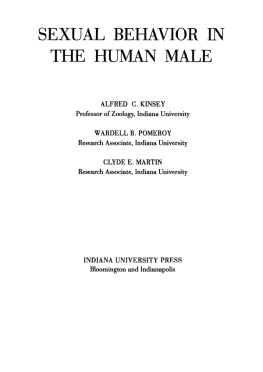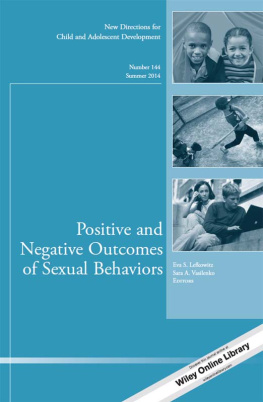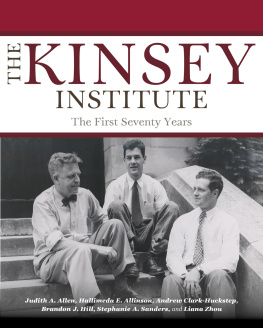SEXUAL BEHAVIOR IN
THE HUMAN MALE
SEXUAL BEHAVIOR IN
THE HUMAN MALE
ALFRED C. KINSEY
Professor of Zoology, Indiana University
WARDELL B. POMEROY
Research Associate, Indiana University
CLYDE E. MARTIN
Research Associate, Indiana University
INDIANA UNIVERSITY PRESS
Bloomington and Indianapolis
This edition is a publication of
Indiana University Press
601 North Morton Street
Bloomington, IN 47404-3797 USA
www.indiana.edu/~iupress
Telephone orders 800-842-6796
Fax orders 812-855-7931
Orders by e-mail iuporder@indiana.edu
Originally published in 1948 by W. B. Saunders Company
Copyright renewed 1975
Anne K. Call, Bruce McMillen Kinsey, and Joan K. Reid
All rights reserved
No part of this book may be reproduced or utilized in any form or by
any means, electronic or mechanical, including photocopying and
recording, or by any information storage and retrieval system, without
permission in writing from the publisher. The Association of American
University Presses Resolution on Permissions constitutes the only
exception to this prohibition.
The paper used in this publication meets the minimum requirements of
American National Standard for Information SciencesPermanence of
Paper for Printed Library Materials, ANSI Z39.48-1984.
Manufactured in the United States of America
Cataloging information for this book is available from the
Library of Congress.
ISBN 0-253-33412-8 (cloth)
1 2 3 4 5 03 02 01 00 99 98
TO
the twelve thousand persons who
have contributed to these data
AND TO
the eighty-eight thousand more who,
someday, will help complete this study
Seen from the four points of the compass a great mountain may present aspects that are very different one from the otherso different that bitter disagreements can arise between those who have watched the mountain, truly and well, through all the seasons, but each from a different quarter. Reality, too, has many facetssome too readily disputed or denied by those who rely only on their own experience. Nor can science itself rightly lay claim to finality or the complete comprehension of reality, but only to honesty and accuracy of the additional facets it may be permitted to discover and report. I say may be permitted since the human race is familiar with the suppression of truth in both small matters and great. The history of science is part of the history of the freedom to observe, to reflect, to experiment, to record, and to bear witness. It has been a perilous and a passionate history indeed, and not yet ended.
Living creatures possess three basic characteristics or capacitiesgrowth, adaptation, and reproduction. In human biology, the reproductive function has been the least and the last studied, scientifically. To the National Research Councils Committee for Research on Problems of Sex belongs the credit for sponsoring a more significant series of research studies on sex than has been accomplished perhaps by any other agency. Among these studies the findings of Dr. Alfred C. Kinsey and his associates at Indiana University deserve attention for their extent, their thoroughness, and their dispassionate objectivity. Dr. Kinsey has studied sex phenomena of human beings as a biologist would examine biological phenomena, and the evidence he has secured is presented from the scientists viewpoint, without moral bias or prejudice derived from current taboos.
Certainly no aspect of human biology in our current civilization stands in more need of scientific knowledge and courageous humility than that of sex. The history of medicine proves that in so far as man seeks to know himself and face his whole nature, he has become free from bewildered fear, despondent shame, or arrant hypocrisy. As long as sex is dealt with in the current confusion of ignorance and sophistication, denial and indulgence, suppression and stimulation, punishment and exploitation, secrecy and display, it will be associated with a duplicity and indecency that lead neither to intellectual honesty nor human dignity.
These studies are sincere, objective, and determined explorations of a field manifestly important to education, medicine, government, and the integrity of human conduct generally. They have demanded from Dr. Kinsey and his colleagues very unusual tenacity of purpose, tolerance, analytical competence, social skills, and real courage. I hope that the reader will match the authors with an equal and appropriate measure of cool attention, courageous judgment, and scientific equanimity.
ALAN GREGG
The Medical Sciences
Rockefeller Foundation
New York City
First of all, acknowledgment should be made to the 12,000 persons who have contributed histories, and particularly to the 5300 males who have provided the data on which the present volume is based. These persons represent each and every age, from children to the oldest groups; they represent every social level, of several racial groups. If these persons had not helped there would have been no study. It has taken considerable courage for many of them to discuss such intimate aspects of their histories, and to risk their confidences with the scientific investigators. They have contributed in order that there should be an increase in our knowledge of this important aspect of human biology and sociology. It is unfortunate that we cannot name each and every one involved. Those who have spent time in persuading their friends to cooperate have contributed in a very special way; and to them we are especially indebted for devoted and effective service.
Herman R Wells, the President of Indiana University, Fernandus Payne, Dean of the Graduate School of the University, the Trustees, and others in the Administration of the University have constantly encouraged, materially supported, and stoutly defended the importance of this research.
The Rockefeller Foundation has contributed a major portion of the cost of the program during the past six years. Dr. Alan Gregg, as Director for the Medical Sciences of The Foundation, has encouraged a wide-scale, long-time project which would adequately cover all social levels and all aspects of sexual behavior in our society.
The National Research Councils Committee for Research on Problems of Sex, as a part of the Medical Division of the Council, has administered the funds granted by The Rockefeller Foundation. It has encouraged and advised on many aspects of the research. Especial mention should be made of the cordial support given by Dr. Robert M. Yerkes, who has served as Chairman of the Research Councils Committee since its inception more than twenty-five years ago. Under Dr. Yerkes guidance the Committee has contributed to a long list of notable projects on the sex endocrines; on the behavior of chimpanzees at the Yerkes Laboratories at Orange Park, Florida; on the behavior of lower mammals, particularly under the direction of Dr. Frank A. Beach, formerly at the American Museum of Natural History and now at Yale University; and on the human studies which were published by Peck and Wells (1923, 1925), by Hamilton (1929), by Katherine Davis (1929), by Terman et al. (1938), by Landis (1940, 1942), and by still others.
The statistical set-up of the research was originally checked by Dr. Lowell Reed of the School of Hygiene and Public Health at The Johns Hopkins University. A long list of persons experienced in sampling and in other aspects of statistics has been constantly available for consultation. We are especially indebted to Dr. Frank K. Edmondson, Chairman of the Department of Astronomy at Indiana University, for continual guidance and supervision of the details of the statistical methods which have been used.










